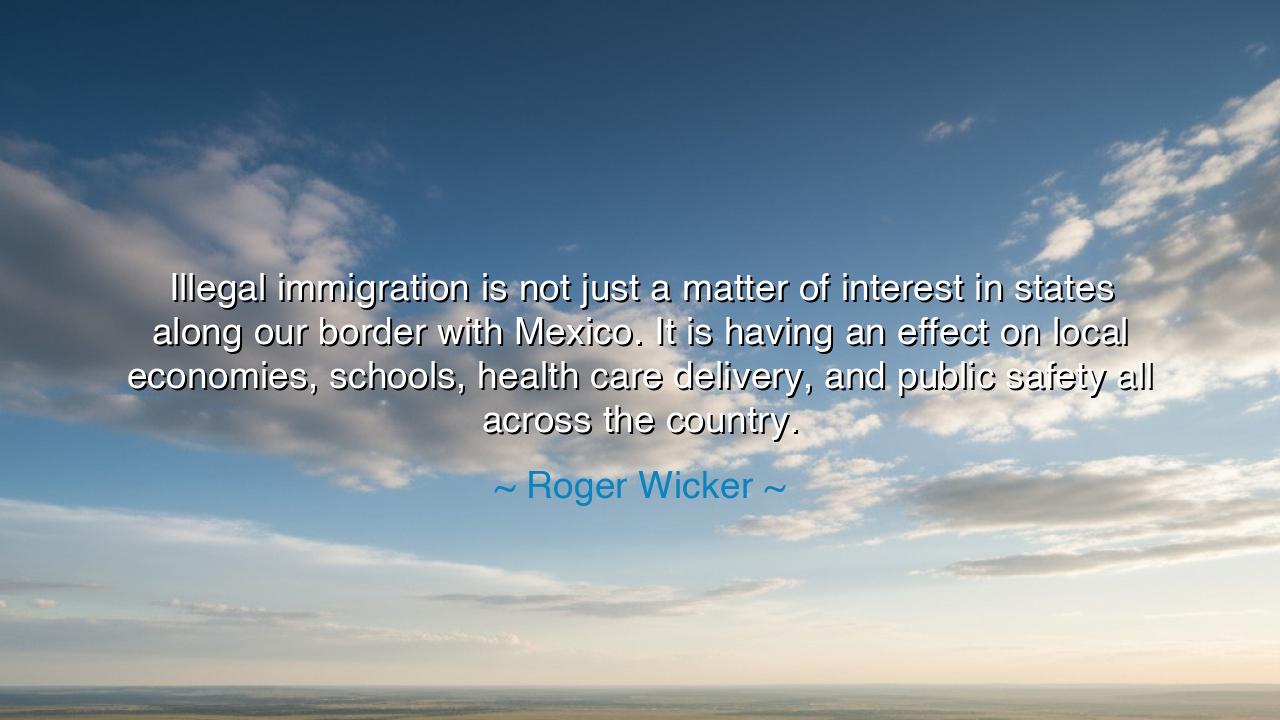
Illegal immigration is not just a matter of interest in states
Illegal immigration is not just a matter of interest in states along our border with Mexico. It is having an effect on local economies, schools, health care delivery, and public safety all across the country.






The statesman Roger Wicker once declared: “Illegal immigration is not just a matter of interest in states along our border with Mexico. It is having an effect on local economies, schools, health care delivery, and public safety all across the country.” In these words lies not merely a statement of policy, but a call to understanding—an acknowledgment that the movements of people, lawful or not, ripple through the fabric of a nation like stones cast into a still pond. Immigration, legal or illegal, is not an isolated event upon the frontier; it is a living current that touches every shore, shaping destinies, testing compassion, and demanding wisdom from all who govern and all who dwell within the land.
In the ancient days, nations were not built upon walls, but upon hearts that dared to cross rivers and mountains in search of hope. Yet even then, the elders knew that balance was sacred. A city could not stand if its gates were flung open without discernment, nor could it thrive if compassion turned to neglect. Wicker’s words are not born of hostility, but of this age-old truth—that the strength of a people lies in their ability to welcome with wisdom and govern with justice. For when the flow of migration becomes unbalanced, when laws are broken without order or accountability, even the most prosperous society begins to strain beneath the weight of its own generosity.
To understand his meaning, one need only recall the story of the Roman Empire. For centuries, it grew strong by embracing outsiders—Greeks, Gauls, and Africans alike—granting them citizenship and a place within its mighty order. But as the centuries passed, the borders weakened, and migrants entered not through the gates of law but through the breaches of neglect. The empire’s resources, once abundant, began to fracture under the strain of maintaining both protection and provision. Yet the lesson was not that Rome should have closed its doors—it was that it failed to guard them wisely, and failed to bring those within its walls into the unity of its laws and culture. So too, Wicker’s warning is one of stewardship, not rejection: that compassion without structure becomes chaos, and generosity without limits can erode the very foundations that make generosity possible.
For every nation is like a household. Within it are the children—the citizens—whose welfare must first be secured if the home is to endure. When too many enter without order, the table grows crowded, the bread runs thin, and resentment can breed where kindness once flourished. Local economies, schools, and health care systems, as Wicker reminds us, are the first to bear the burden of imbalance. A teacher with too many students cannot give each the care they deserve; a hospital stretched beyond capacity cannot heal all who suffer; a city’s resources, spread too thin, may crumble beneath the weight of need. The intention of mercy must walk hand in hand with the wisdom of restraint, lest both be lost.
Yet let no heart grow cold. For every immigrant, legal or illegal, carries within them a story—a fire born of desperation or hope. The wise leader does not condemn that fire but seeks to contain it within laws that protect both the wanderer and the host. Wicker’s words, though stern, invite reflection, not division. They ask us to remember that order and compassion must coexist, that justice without mercy is tyranny, but mercy without justice is folly. The challenge of our age, as in all ages before it, is to build bridges that are guarded, doors that open with purpose, and systems that neither collapse under chaos nor calcify under fear.
We may look to the story of Ellis Island, that gateway through which millions passed into the promise of America. There, dreams were not crushed by law but shaped by it. The immigrant entered with humility, the nation received with honor, and together they forged a covenant of belonging. Such order gave rise to greatness—a model of lawful inclusion that balanced compassion with responsibility. In our time, the same spirit must prevail, not through neglect of law, but through renewal of its just purpose.
So, let this be the lesson for all who listen: a nation must not harden its heart against the stranger, nor must it abandon the order that preserves its soul. The care of the citizen and the dignity of the newcomer must be held in sacred balance. Each policy, each decision, must seek harmony between justice and mercy, strength and compassion. For when a people lose this balance, they drift either into cruelty or into collapse.
Therefore, O listener, be neither blind to suffering nor careless with sovereignty. Seek to understand, not to condemn. Support laws that are fair and firm, and leaders who act with both courage and compassion. For a nation, like a body, thrives only when all its parts are in balance—when its heart of mercy beats in rhythm with its mind of reason. And thus, Wicker’s words, spoken for our age, echo an ancient truth: that the security of a land depends not only on its borders, but on the wisdom with which it guards both its people and its principles.






AAdministratorAdministrator
Welcome, honored guests. Please leave a comment, we will respond soon